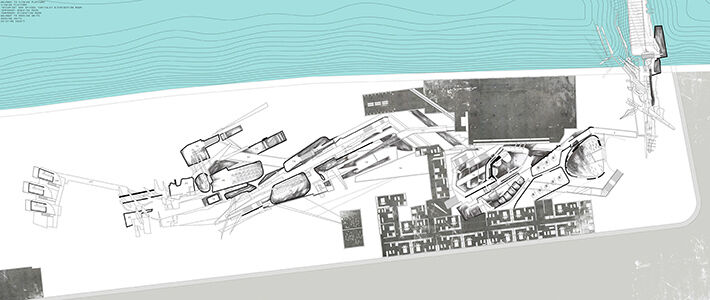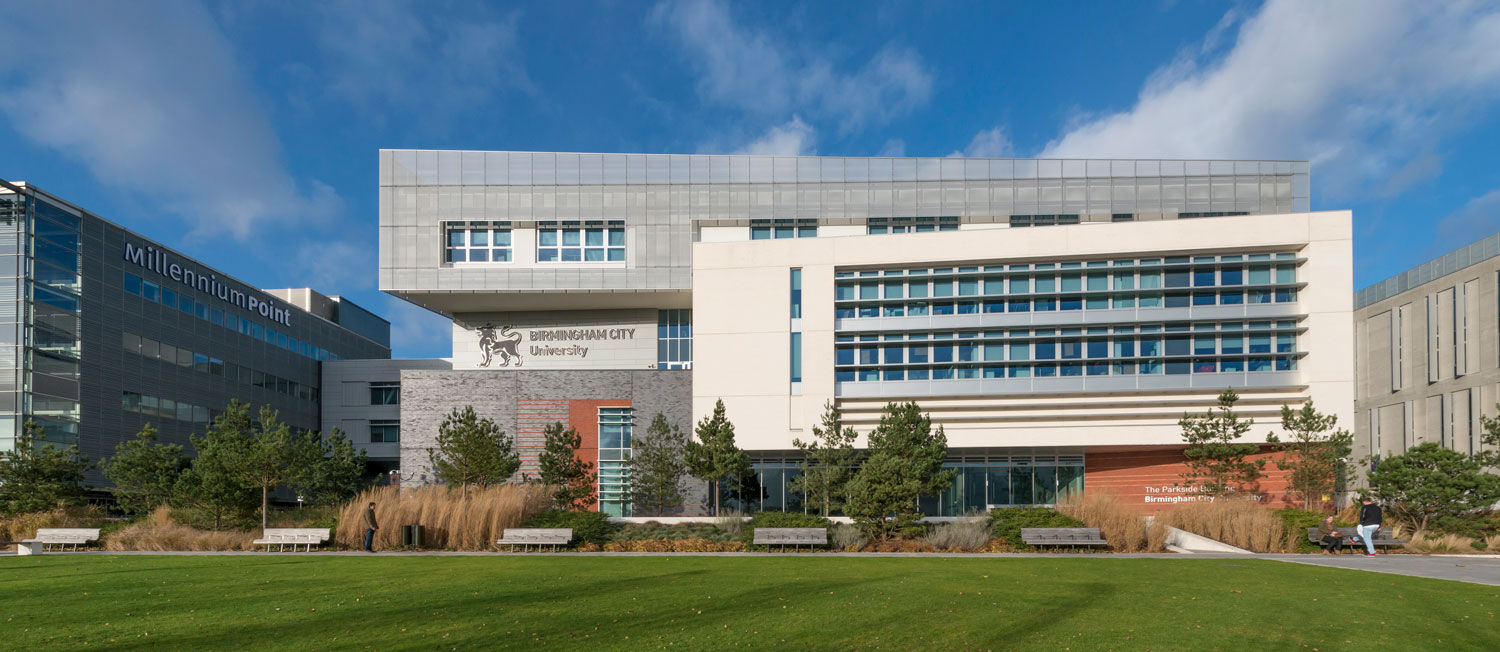
Architect Apprenticeship (Level 7) (RIBA Part II and Part III) - MArch / PgDip
Currently viewing course to start in 2025/26 Entry.
Our Architect (Integrated Degree) Apprenticeship supports your learning in gaining the title of architect, whilst enjoying the benefits of working in an architectural practice during your studies. The apprenticeship runs for 4.5 years for candidates that work at an eligible architecture firm....
- Level Apprenticeship
- Study mode Full Time
- Award MArch / PgDip
- Start date September 2025
- Subject
- Location City Centre
This course is:
Overview
Our Architect (Integrated Degree) Apprenticeship supports your learning in gaining the title of architect, whilst enjoying the benefits of working in an architectural practice during your studies.
The apprenticeship runs for 4.5 years for candidates that work at an eligible architecture firm. During your ‘off-the-job’ learning, you’ll be based in our multi million-pound City Centre Campus Parkside Building with access to advanced digital studios for rapid prototyping and digital production, with access to drawing, CAD and digital visual communication skills workshops.
Our apprentices are fully integrated with our full and part time masters students. We value the principles of learning by making, drawing on a rich history of craft and manufacture in the city, as well as embedding research by design principles across modules to be ready in future-practice and face complex design challenges in an ever changing environment.
How to apply
You apply for a degree apprenticeship in the same way you apply for a normal job. You’ll need to submit an application to the recruiting employer.
Employers advertise degree apprenticeships throughout the year and there is no application cycle like there is with university applications. The vacancy will state when the application deadline is, and when the apprenticeship is due to start.
You cannot apply directly to the University for a degree apprenticeship. To apply for an apprenticeship, you first need to find one that you are interested in applying for.
Find an Apprenticeship is the government website where the majority of apprenticeship vacancies are advertised. It only shows live jobs (so it won’t tell you previous vacancies, nor what’s coming up), so you will need to check it regularly to see new vacancies as the employers advertise them.
What's covered in this course?
The Architect (Integrated Degree) Apprenticeship offers an innovative learning opportunity for students working in an architectural practice who are looking to develop a focussed relationship with their employers whilst obtaining the skills and knowledge towards becoming an architect. It incorporates modules across the MArch (RIBA Part 2) and PG Dip Architectural Practice (RIBA Part 3), with awards in each.
During ‘off-the-job’ on campus learning, you’ll explore aspects of architectural design and theory through our studios led by inspiring tutors. You’ll be introduced to diverse approaches to research before embarking on a Special Study.
You’ll also engage with live projects as part of our Advanced Praxis module, working collectively on projects that have a real-world impact. Our Co.Lab projects also provide opportunities for interdisciplinary exploration with other course on live projects that engage with a variety of partners; schools, charities, artists, and manufacturers.
The final part of the Apprenticeship delivers professional skills in relation to building procurement and contract administration, and prepares you for the Design Challenge and Professional Interview (the ‘End Point Assessment’) at the conclusion of the programme.
As a School we take a proactive stance on the climate crisis and the spatial injustices inherent in the city, viewing them as intersectional issues to which the profession must respond. This includes a concern for life safety and wellbeing in architectural design.
You'll be supported throughout your studies by our experienced and talented tutors and technical staff, with regular tripartite progress reviews with your practice.
You can view the latest student work on our Graduate Show page.

Entry Requirements
Notes for Apprentices:
You must have the minimum of a ARB-prescribed Part 1 qualification or Part 1 equivalent as prescribed by the ARB (as set out by the IATE). We ask that you have an upper second-class honours degree (2:1) as a minimum.
You should have English and Maths at Level 2 on entry. Those without will need to achieve that level before taking their end-point assessment (as set out by the IATE).
We ask that you have at least 9 months of post-Part 1 professional practice experience. However, please contact us if you have less since this is negotiable on application. You should be employed approximately 37.5 hours a week in an architecture practice registered on the Apprenticeship scheme.
To apply, please contact the School of Architecture and Design directly at adm.apprenticeships@bcu.ac.uk. We recommend you apply a minimum of 20 weeks prior to the September start date of the Apprenticeship. We cannot consider applications after this due to the length of time it takes to assess the application, set up contracts and enrol apprentices.
If the conditions for entry are met, a tripartite interview will be arranged where you will present a written critical self-appraisal (single side of A4), and a diverse portfolio demonstrating academic and professional experience, including the following:
- Final project from your BA course
- Other projects from final year or second year
- A copy of your written dissertation or final year essay
- Selected excerpts from sketchbooks and workbooks
- A range of work from your practical training year or architectural employment (this includes technical work as well as design and presentation work)
- Evidence of your RIBA Part 1 exemption (e.g. BA certificate)
If successful at interview, you will complete a ‘Knowledge, Skills and Behaviours’ ‘Skills Scan’ before contract documents are sent to your employer.
Engagement with and achievement on the Apprenticeship will be tracked throughout via our online learning portal APTEM. You will be required to make monthly logs of your work of ‘on’ and ‘off-the-job’ learning, and participate in regular tripartite reviews.
Notes for Employers:
An apprenticeship is a job and should be advertised as one.
Applicants are required to have a contract of employment with an architectural practice with a nominated mentor, line manager, apprenticeship coordinator and buddy. The employment contract, commitment statement and apprenticeship agreement will include information about remuneration and benefits. Apprentices will be paid for time to attend training as part of the apprenticeship standard, amounting to 20% of the total Apprenticeship (the ‘off-the-job’ training). All apprentices must receive the same benefits as other employees. They must be paid at least the national minimum wage, and have the same rights as other employees. They will be entitled to the statutory rights in relation to, for example: working time; holidays; maternity; paternity; adoption; shared parental leave and pay; discrimination; whistle blowing and unfair dismissal. The same rules will also apply for dismissal and redundancy.
The Apprenticeships Levy is paid by companies with an annual wage bill higher than £3m. Employers who do not qualify for the levy can enter a co-investment agreement where the government co-invests 95% of the funding while the employer pays 5% of the funding.
Apprenticeships funding rules can be found here.
The Standard for the Architect (Level 7 Integrated Degree) can be found here.
Industry links
The course and our school have a number of key industry links; from live project partners in modules, to interdisciplinary collaborators that bring creative opportunities for our students and apprentices.
The school has long-standing partnerships with industry manufacturers such as Ibstock Bricks, Ash & Lacy Systems and D-Line, working collaboratively to develop new architectural products. We form part of the wider creative community with STEAMhouse and the Birmingham Architectural Association to help our graduates be part of a large network for creative opportunities.
Our Co.LAB initiative has established a reputation for considerate community engagement with a wide range of civic participants including local resident groups, arts organisations, local authorities and commercial companies.
We work with a number of established and emerging practitioners from Zaha Hadid, Gensler, Foster + Partners, to designers from small boutique design practices that bring innovative knowledge and progressive approaches to your learning experience. This is supplemented with our Visiting Professors including George Clarke, Dr. Anna Keay OBE and Glenn Howells.
What's included in your course fees
Course fees are covered by practice contributions to the levy, or by co-investment for non-levy paying practices.
Since you cannot be asked to pay towards your education, practices should ensure that they are able to cover expenses related to;
- IT (hardware and software)
- Consumables for printing, model making, portfolios and PPE
- Travel in relation to study visits associated directly with the programme
What is an apprenticeship?
Higher and degree apprenticeships combine a university education with workplace experience, offering an opportunity to gain a recognised qualification while working full-time.
Accredited By
This course is accredited by:
Why Choose Us?
- Apprenticeships offer work based learning – the opportunity to build on existing knowledge and skills.
- You will be supported by highly experienced tutors with a wide range of specialisms and industry experience to support you both with your studies and in practice.
- We have excellent facilities on campus including state-of-the-art equipment, study spaces and an extensive library of learning resources to support you with your studies.
- Study alongside other individuals who have experience within your industry. You will be able to build valuable networks, sharing best practice and supporting you with your future career opportunities.
- At the end of the course, you will have three years work experience and a Master's-level qualification, without taking on any student debt.
Facilities & Staff

Our Facilities
When you join Birmingham City University, the first thing you will notice is the exceptional quality of our campuses. With an investment of over £400 million across our buildings and facilities, we are committed to giving you the very best learning environment to help shape your experience.
You will be based in our multi-million pound Parkside building – a state of the art facility located within our City Centre Campus. Here you will have full access to our recently upgraded, high spec CAD (Computer-Aided-Design) workstations situated within our dedicated computer labs and open access areas. We also provide access to leading edge digital design software, enabling you to explore technical drawing, graphics, 3D modelling, visualization, animation, computation, simulation, and virtual reality.
The Parkside Building is also home to our digital fabrication labs, where you will be able to explore 3D printing, laser cutting, CNC machining, ceramics, glass and traditional model-making, guided by our team of expert technicians with access to our on-site material store, and professional printing facilities.
You’ll also benefit from:
- Design studios
- Physical and digital library
- Loanable laptops
- Dedicated social spaces
- Cafés
Photo Gallery
From industry-standard software, to our workshops and studio spaces, everything you need will be at your fingertips from day one. Working with our dedicated teaching teams and expert technicians, you'll be supported from concept through to completion.
Our staff
Alessandro Columbano
Associate Professor
Alessandro is the course director for the MArch Architecture (RIBA pt.2) and L7 Architect Apprenticeship. He also co-established and leads the Co\\aborative Lab:oratory (Co.LAB) an inter-disciplinary design-research initiative within the school that integrates teaching with contemporary creative practices through live projects, design research and...
More about AlessandroIan Shepherd
Associate Professor / Director of Professional Studies / Course Director Postgraduate Diploma in Architectural Practice (Part 3)
Ian has been involved with architectural practice on a professional level since qualifying in 1990. He was a one of the founding partners in Birmingham based D5 Architects LLP where he remained as a consultant until April 2017. In addition to his commitment to architecture and the built environment through the practice, he is also interested in...
More about IanProfessor Rachel Sara
Oscar Naddermier Professor of Architecture | National Teaching Fellow
Rachel’s research explores the way in which health and wellbeing can be affected by architecture and design. She also explores ‘other' forms of architecture, specifically examining transdisciplinary architecture practices through collaborations between architecture and dance, co-design and hands-on, community based architectural...
More about RachelDr Jemma Browne
Head of the College of Architecture
Jemma is the Head of the College of Architecture. She teaches history and theory of Architecture and Design and coordinates the overall delivery and development of this strand of all the architecture courses, as well as contributing to the development of the architecture research environment and supervising PhD students.
More about JemmaDr Michael Dring
Academic Lead for Architecture & Senior Lecturer in Architecture
Michael Dring is an architect, educator, research scholar and artist, working across the fields of architecture, landscape and art. Educated at the Manchester School of Architecture, Michael has worked in Birmingham for over 20 years in award-winning architectural practice and as course leader and tutor at Birmingham School of Architecture &...
More about Michael









